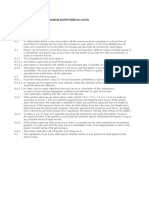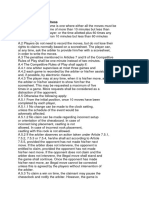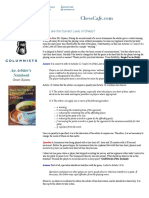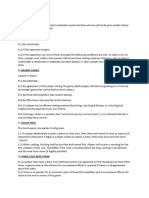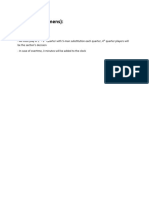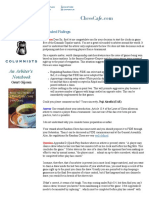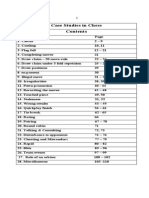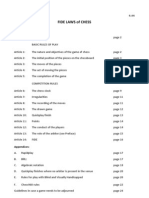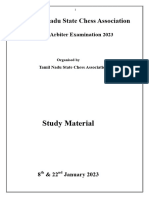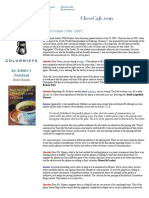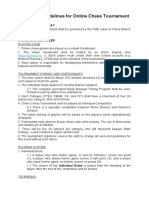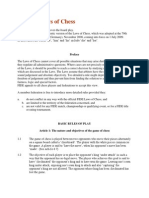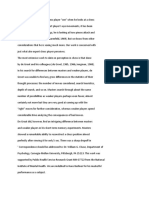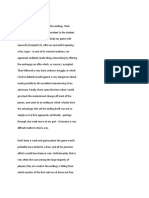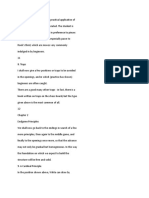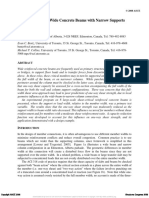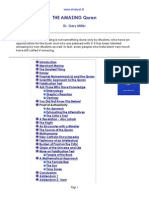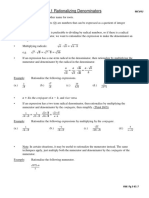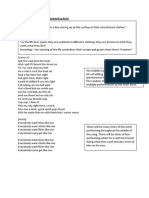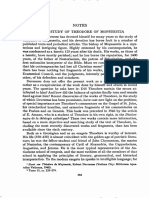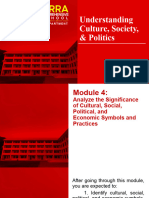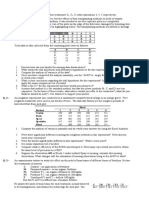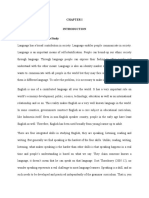7.1 a.
If during a game it is found that the initial position of the pieces was incorrect, the
game shall be cancelled and a new game played.
b. If during a game it is found that the chessboard has been placed contrary to Article
2.1, the game continues but the position reached must be transferred to a correctly
placed chessboard.
7.2 If a game has begun with colours reversed then it shall continue, unless the arbiter rules
otherwise.
7.3 If a player displaces one or more pieces, he shall re-establish the correct position on his
own time. If necessary, either the player or his opponent shall stop the clocks and ask for
the arbiter’s assistance. The arbiter may penalise the player who displaced the pieces.
7.4 a. If during a game it is found that an illegal move, including failing to meet the
requirements of the promotion of a pawn or capturing the opponent’s king, has
been completed, the position immediately before the irregularity shall be
reinstated. If the position immediately before the irregularity cannot be determined
the game shall continue from the last identifiable position prior to the irregularity.
The clocks shall be adjusted according to Article 6.13. The Articles 4.3 and 4.6 apply
to the move replacing the illegal move. The game shall then continue from this reinstated position.
b. After the action taken under Article 7.4.a, for the first two illegal moves by a player
the arbiter shall give two minutes extra time to his opponent in each instance; for a
third illegal move by the same player, the arbiter shall declare the game lost by this
player. However, the game is drawn if the position is such that the opponent cannot
checkmate the player’s king by any possible series of legal moves.
7.5 If during a game it is found that pieces have been displaced from their squares, the
position before the irregularity shall be re-instated. If the position immediately before the
irregularity cannot be determined, the game shall continue from the last identifiable
�position prior to the irregularity. The clocks shall be adjusted according to Article 6.13.
The game shall then continue from this re-instated position.
Article 8: The recording of the moves
8.1 In the course of play each player is required to record his own moves and those of his
opponent in the correct manner, move after move, as clearly and legibily as possible, in
the algebraic notation (See Appendix C), on the scoresheet prescribed for the
competition.
It is forbidden to write the moves in advance, unless the player is claiming a draw
according to Article 9.2, or 9.3 or adjourning a game according to the Guidelines of
Adjourned Games point 1.a.
A player may reply to his opponent’s move before recording it, if he so wishes. He must
record his previous move before making another.
Both players must record the offer of a draw on the scoresheet. (See Appendix C.13)
12
If a player is unable to keep score, an assistant, who must be acceptable to the arbiter,
may be provided by the player to write the moves. His clock shall be adjusted by the
arbiter in an equitable way.
8.2 The scoresheet shall be visible to the arbiter throughout the game.
8.3 The scoresheets are the property of the organisers of the event.
8.4 If a player has less than five minutes left on his clock at some stage in a period and does
not have additional time of 30 seconds or more added with each move, then for the
remainder of the period he is not obliged to meet the requirements of Article 8.1.
Immediately after one flag has fallen the player must update his scoresheet completely
before moving a piece on the chessboard.
8.5 a. If neither player is required to keep score under Article 8.4, the arbiter or an
�assistant should try to be present and keep score. In this case, immediately after
one flag has fallen, the arbiter shall stop the clocks. Then both players shall update
their scoresheets, using the arbiter’s or the opponent’s scoresheet.
b. If only one player is not required to keep score under Article 8.4, he must, as soon
as either flag has fallen, update his scoresheet completely before moving a piece on
the chessboard. Provided it is the player’s move, he may use his opponent’s
scoresheet, but must return it before making a move.
c. If no complete scoresheet is available, the players must reconstruct the game on a
second chessboard under the control of the arbiter or an assistant. He shall first
record the actual game position, clock times and the number of moves made, if this
information is available, before reconstruction takes place.
8.6 If the scoresheets cannot be brought up to date showing that a player has overstepped
the allotted time, the next move made shall be considered as the first of the following
time period, unless there is evidence that more moves have been made.
8.7 At the conclusion of the game both players shall sign both scoresheets, indicating the
result of the game. Even if incorrect, this result shall stand, unless the arbiter decides
otherwise.
Article 9: The drawn game
9.1 a. The rules of a competition may specify that players cannot agree to a draw,
whether in less than a specified number of moves or at all, without the consent of
the arbiter.
b. If the rules of a competition allow a draw agreement the following apply:
(1) A player wishing to offer a draw shall do so after having made a move on the
chessboard and before stopping his clock and starting the opponent’s clock.
An offer at any other time during play is still valid but Article 12.6 must be
�considered. No conditions can be attached to the offer. In both cases the offer
cannot be withdrawn and remains valid until the opponent accepts it, rejects
it orally, rejects it by touching a piece with the intention of moving or
capturing it, or the game is concluded in some other way.
13
(2) The offer of a draw shall be noted by each player on his scoresheet with a
symbol. (See Appendix C.13)
(3) A claim of a draw under Article 9.2, 9.3 or 10.2 shall be considered to be an
offer of a draw.
9.2 The game is drawn upon a correct claim by the player having the move, when the same
position, for at least the third time (not necessarily by a repetition of moves):
a. is about to appear, if he first writes his move on his scoresheet and declares to the
arbiter his intention to make this move, or
b. has just appeared, and the player claiming the draw has the move.
Positions as in (a) and (b) are considered the same, if the same player has the move,
pieces of the same kind and colour occupy the same squares, and the possible moves of
all the pieces of both players are the same.
Positions are not the same if a pawn that could have been captured en passant can no
longer be captured in this manner. When a king or a rook is forced to move, it will lose its
castling rights, if any, only after it is moved.
9.3 The game is drawn, upon a correct claim by the player having the move, if:
a. he writes his move on his scoresheet and declares to the arbiter his intention to
make this move, which shall result in the last 50 moves having been made by each
player without the movement of any pawn and without any capture, or
b. the last 50 consecutive moves have been made by each player without the
�movement of any pawn and without any capture.
9.4 If the player touches a piece as in Article 4.3 without having claimed the draw he loses the
right to claim, as in Article 9.2 or 9.3, on that move.
9.5 If a player claims a draw as in Article 9.2 or 9.3 he may stop both clocks. (See Article
6.12.b) He is not allowed to withdraw his claim.
a. If the claim is found to be correct, the game is immediately drawn.
b. If the claim is found to be incorrect, the arbiter shall add three minutes to the
opponent’s remaining thinking time. Then the game shall continue. If the claim was
based on an intended move, this move must be made as according to Article 4.
9.6 The game is drawn when a position is reached from which a checkmate cannot occur by
any possible series of legal moves. This immediately ends the game, provided that the
move producing this position was legal.
Article 10: Quickplay Finish
10.1 A ‘quickplay finish’ is the phase of a game when all the (remaining) moves must be made
in a limited time.
10.2 If the player, having the move, has less than two minutes left on his clock, he may claim a
draw before his flag falls. He shall summon the arbiter and may stop the clocks. (See
Article 6.12.b)
14
a. If the arbiter agrees the opponent is making no effort to win the game by normal
means, or that it is not possible to win by normal means, then he shall declare the
game drawn. Otherwise he shall postpone his decision or reject the claim.
b. If the arbiter postpones his decision, the opponent may be awarded two extra
minutes and the game shall continue, if possible in the presence of an arbiter. The
arbiter shall declare the final result later in the game or as soon as possible after a
�flag has fallen. He shall declare the game drawn if he agrees that the final position
cannot be won by normal means, or that the opponent was not making sufficient
attempts to win by normal means.
c. If the arbiter has rejected the claim, the opponent shall be awarded two extra
minutes time.
d. The decision of the arbiter shall be final relating to (a), (b) and (c).
Article 11: Points
11.1 Unless announced otherwise in advance, a player who wins his game, or wins by forfeit,
scores one point (1), a player who loses his game, or forfeits scores no points (0) and a
player who draws his game scores a half point (½).
Article 12: The conduct of the players
12.1 The players shall take no action that will bring the game of chess into disrepute.
12.2 Players are not allowed to leave the ‘playing venue’ without permission from the arbiter.
The playing venue is defined as the playing area, rest rooms, refreshment area, area set
aside for smoking and other places as designated by the arbiter.
The player having the move is not allowed to leave the playing area without permission of
the arbiter.
12.3 a. During play the players are forbidden to make use of any notes, sources of
information or advice, or analyse on another chessboard.
b. Without the permission of the arbiter a player is forbidden to have a mobile phone
or other electronic means of communication in the playing venue, unless they are
completely switched off. If any such device produces a sound, the player shall lose
the game. The opponent shall win. However, if the opponent cannot win the game
by any series of legal moves, his score shall be a draw.
c. Smoking is permitted only in the section of the venue designated by the arbiter .
�12.4 The scoresheet shall be used only for recording the moves, the times of the clocks, the
offers of a draw, and matters relating to a claim and other relevant data.
12.5 Players who have finished their games shall be considered to be spectators.
12.6 It is forbidden to distract or annoy the opponent in any manner whatsoever. This includes
unreasonable claims, unreasonable offers of a draw or the introduction of a source of
noise into the playing area.
15
12.7 Infraction of any part of Articles 12.1 to 12.6 shall lead to penalties in accordance with
Article 13.4.
12.8 Persistent refusal by a player to comply with the Laws of Chess shall be penalised by loss
of the game. The arbiter shall decide the score of the opponent.
12.9 If both players are found guilty according to Article 12.8, the game shall be declared lost
by both players.
12.10 In the case of Article 10.2.d or Appendix D a player may not appeal against the decision of
the arbiter.
Otherwise a player may appeal against any decision of the arbiter, unless the rules of the
competition specify otherwise.
Article 13: The role of the Arbiter (See Preface)
13.1 The arbiter shall see that the Laws of Chess are strictly observed.
13.2 The arbiter shall act in the best interest of the competition. He should ensure that a good
playing environment is maintained and that the players are not disturbed. He shall
supervise the progress of the competition.
13.3 The arbiter shall observe the games, especially when the players are short of time,
enforce decisions he has made and impose penalties on players where appropriate.
13.4 The arbiter can apply one or more of the following penalties:
�a. warning
b. increasing the remaining time of the opponent
c. reducing the remaining time of the offending player
d. declaring the game to be lost
e. reducing the points scored in the game by the offending party
f. increasing the points scored in the game by the opponent to the maximum available
for that game
g. expulsion from the event.
13.5 The arbiter may award either or both players additional time in the event of external
disturbance of the game.
13.6 The arbiter must not intervene in a game except in cases described by the Laws of Chess.
He shall not indicate the number of moves made, except in applying Article 8.5, when at
least one flag has fallen. The arbiter shall refrain from informing a player that his
opponent has completed a move or that the player has not pressed his clock.
13.7 a. Spectators and players in other games are not to speak about or otherwise interfere
in a game. If necessary, the arbiter may expel offenders from the playing venue. If
someone observes an irregularity, he may inform only the arbiter.
